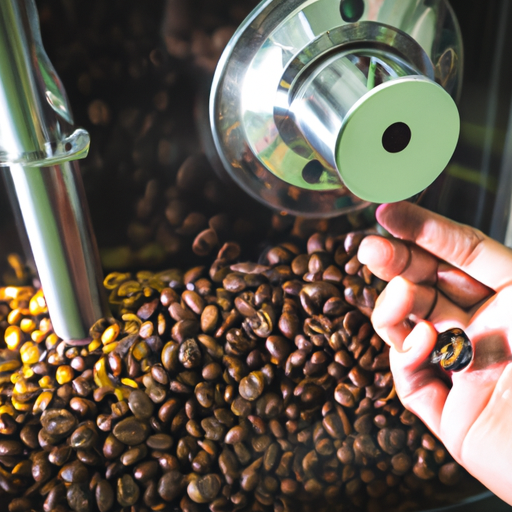Join us as we explore the wonders of tiny yet powerful miracles and uncover the advantages they provide for digestion.
Chia seeds, packed with fiber and nutrients, have become a popular natural digestive aid.
In this article, we’ll uncover the science behind how chia seeds support digestion and boost gut health.
So, let’s embark on this journey of discovery together and uncover the secrets of these incredible little seeds!

Key Takeaways
- Chia seeds are packed with fiber, which promotes healthy digestion.
- The soluble fiber in chia seeds forms a gel-like substance in the digestive system, aiding in nutrient absorption.
- Chia seeds can reduce bloating and regulate bowel movements.
- Including chia seeds in your diet supports optimal digestion and overall gut health.
How Chia Seeds Support Digestive Health
Chia seeds provide numerous digestive benefits for us. These tiny powerhouses are packed with fiber, which plays a crucial role in promoting healthy digestion.
The soluble fiber in chia seeds forms a gel-like substance when mixed with water, which aids in the absorption of nutrients in our digestive system. This can be particularly beneficial for those with nutrient deficiencies or digestive issues.
Additionally, chia seeds have been shown to help alleviate digestive discomfort by reducing bloating and regulating bowel movements. The high fiber content in chia seeds promotes regularity and prevents constipation.
Furthermore, the omega-3 fatty acids found in chia seeds have anti-inflammatory properties that can soothe the digestive tract. Including chia seeds in your diet can support optimal digestion and contribute to overall gut health.

The Fiber Content of Chia Seeds
As we continue exploring the digestive benefits of chia seeds, it’s important to highlight the impressive fiber content they possess. Chia seeds are an excellent source of dietary fiber, which is essential for maintaining a healthy digestive system.
Here are some key points about the fiber content of chia seeds:
- Chia seeds are packed with soluble fiber, which absorbs water and forms a gel-like substance in the digestive tract. This helps to promote feelings of fullness and can aid in weight loss.
- The high fiber content of chia seeds can also help to regulate blood sugar levels. Soluble fiber slows down the absorption of carbohydrates, preventing spikes in blood sugar and promoting better glucose control.
- Incorporating chia seeds into your diet can contribute to a healthy gut by promoting regular bowel movements and preventing constipation.
With their impressive fiber content, chia seeds offer multiple benefits for weight loss, blood sugar control, and gut health.
Now, let’s delve deeper into the connection between chia seeds and gut health.

Chia Seeds and Gut Health
To understand the connection between gut health and chia seeds, let’s explore their impact on the digestive system.
Chia seeds have gained popularity in recent years due to their potential benefits for weight loss and inflammation. These tiny seeds are rich in fiber, which can help promote a healthy digestive system.
The soluble fiber in chia seeds absorbs water and forms a gel-like substance in the gut. This gel can help regulate bowel movements and prevent constipation.
Additionally, chia seeds contain omega-3 fatty acids, which have been shown to reduce inflammation in the body.

Boosting Digestion With Chia Seeds
Continuing our exploration of chia seeds and their impact on gut health, let’s delve into how these tiny powerhouses can boost digestion.
- Chia seed recipes for better digestion: Incorporating chia seeds into your diet can be as simple as adding them to smoothies, yogurt, or oatmeal. Their high fiber content helps regulate bowel movements and promotes healthy digestion.
- Chia seeds and their role in reducing bloating: Chia seeds are known for their ability to absorb water and form a gel-like substance in the stomach. This gel can help soothe the digestive system, reduce inflammation, and alleviate bloating.
- Chia seeds as a source of omega-3 fatty acids: Omega-3 fatty acids have been linked to improved digestive health. Chia seeds are an excellent plant-based source of these essential fats, which can help reduce inflammation in the gut and support overall digestive function.
Incorporating chia seeds into your diet can be a simple and effective way to boost digestion and support a healthy gut. Try incorporating them into your favorite recipes or explore new chia seed-based dishes for a digestive health boost.
Chia Seeds as a Natural Digestive Aid
Chia seeds serve as a natural digestive aid, supporting overall gut health and promoting optimal digestion. These tiny powerhouses are packed with fiber, which is essential for a healthy digestive system. The high fiber content in chia seeds helps to regulate bowel movements and prevent constipation.
Additionally, chia seeds can provide relief from bloating and abdominal discomfort. The soluble fiber in chia seeds forms a gel-like substance in the digestive tract, which helps to soften stools and promote regularity. This can be especially beneficial for individuals who struggle with digestive issues such as irritable bowel syndrome (IBS) or inflammatory bowel disease (IBD).

Including chia seeds in your diet can be a simple and effective way to improve your digestive health and enjoy the benefits of a well-functioning gut.
Frequently Asked Questions
Are There Any Potential Side Effects or Risks Associated With Consuming Chia Seeds for Digestive Health?
There may be potential side effects and risks associated with consuming chia seeds for digestive health. It is important to be aware of these before incorporating them into our diet.
Can Chia Seeds Help With Specific Digestive Conditions Such as Constipation or Irritable Bowel Syndrome (Ibs)?
Chia seeds can help improve digestive regularity by aiding in the movement of food through the gut. They may also provide relief for specific conditions like constipation and IBS, promoting overall gut health.
How Should Chia Seeds Be Consumed to Maximize Their Digestive Benefits?
To maximize the digestive benefits of chia seeds, we recommend incorporating them into chia seed recipes like chia seed pudding. This allows for optimal absorption of nutrients and promotes healthy digestion.

Are There Any Alternative Ways to Incorporate Chia Seeds Into a Diet for Digestive Health Besides Simply Adding Them to Smoothies or Yogurt?
There are plenty of alternative recipes and creative uses for incorporating chia seeds into a diet for digestive health. Adding them to overnight oats or using them as an egg substitute are just a couple of examples.
Can Chia Seeds Be Used as a Natural Remedy for Acid Reflux or Heartburn?
Chia seeds can be a natural remedy for indigestion and may help reduce gastric reflux. Studies suggest their effectiveness in soothing acid reflux symptoms, making them a beneficial addition to a digestive health routine.
Conclusion
In conclusion, chia seeds are the ultimate digestive superheroes! With their high fiber content and ability to promote gut health, these tiny powerhouses can turbocharge your digestion like never before.
Say goodbye to sluggishness and hello to smooth sailing in your digestive system. Incorporating chia seeds into your diet is a natural and effective way to support your digestive health.

So go ahead, sprinkle some chia seeds on your meals and let them work their magic!
















